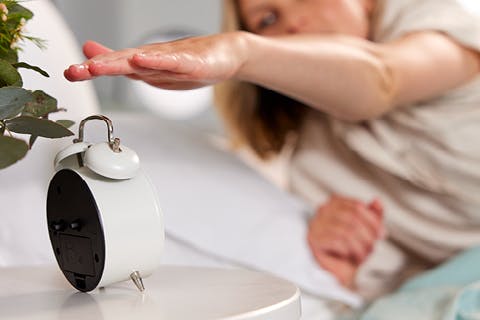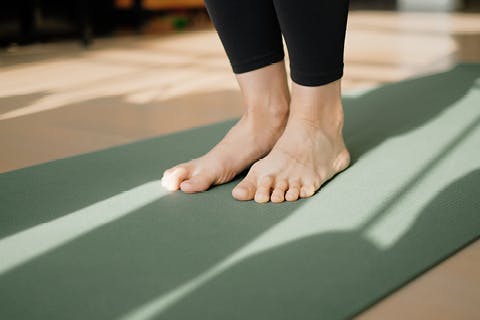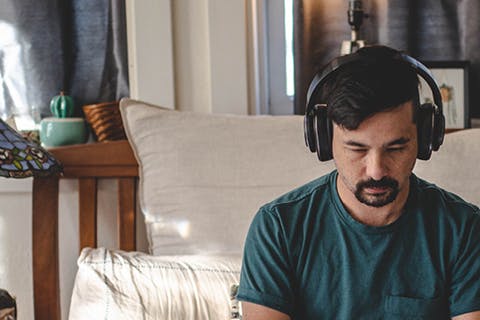How to fall asleep fast

Longing for your bed only moments after opening your eyes and waking up in the morning is a common problem. For those who struggle to get a full 8 hours, the thought of having yet another sleepless night can cause unneeded stress. It's a vicious, exhausting cycle, often translating into over-exhausting, tossing and turning with even the easiest conversation feeling fraught with too little sleep!
If this sounds like you, we’re here to help with a few tips for falling asleep, ensuring you can wake up feeling bright-eyed and bushy-tailed after a long, long rest between your favourite sheets.
5 ways to fall asleep

1. Stick to a night-time routine
Did you know your brain needs time to process go-to-sleep signals? Make sure your body gets the message sooner with a consistent night-time routine, including an adequate wind-down period with minimal light exposure.
That’s right, the bright bulbs and bluescreens around us (and sunlight, should you need to sleep during the day) are hood-winking your efforts to sleep more, preventing the pineal gland from doing its job and producing the rest hormone, melatonin. Try hacking this powerful sleep system and replace screen time with reading time in a yellow-lit environment before hopping into bed. Also, don’t forget to draw your black-out blinds closed before slipping into snooze land.

2. Meditation and mindfulness
Meditation, mindfulness and chamomile tea can be the perfect recipe for a better night’s sleep. Not only do meditation and mindfulness help you relax and let go of the day’s tension, but these practices also improve the quality of your sleep too.
Doing some simple and effective breathing exercises 30 minutes before collapsing into bed prepares the mind to drift off and detach from stress or anxiety. Box-breathing and body scan meditations reflect on the body as a whole and can help to send you into a deeper state of relaxation.

3. Maintain a sleep schedule
Humans are creatures of habit, so having a sleep schedule is a great way to ensure you get enough sleep and fall into a routine. Aiming to wake up and go to sleep at similar times throughout the week ensures you don’t over or under sleep and your body will begin to naturally adjust to a consistent schedule. Why not try setting an alarm on your phone to let you know it’s time to start winding down?

4. Be mindful of the temperature
Your core body temperature has a circadian rhythm of its own, so ensuring your bedroom is at a modest temperature can help minimise any restlessness. If the temperature in your room is too hot or cold, your body will attempt to adjust, which can cause a bit of restlessness.

5. Sink into comfort
Good quality bedding often gets overlooked, but it can be one of the best strategies that can improve sleep quickly. Investing in a good-quality fitted mattress and pillows can help you get comfortable and assist to stay supported throughout the night. Similarly, pyjamas made of linen or cotton fabrics will help keep your body temperature stable and non-irritated.
Sleep hygiene checklist
Lifestyle factors play a big role in how you sleep, and daily habits formed over many years can play an integral role in why you struggle to wind down.

Good sleep hygiene includes:
- Having regular meal times throughout the day
- Balancing your sleep-wake circadian rhythm by waking up and falling asleep at the same time
- Crafting a night-time routine that works for you. Reading a book, drinking camomile tea and journaling can be great ways to switch off
- Investing in earplugs and an eye mask to minimise waking throughout the night
- Incorporating stress relief techniques like breathwork and meditation before bed
- Removing natural light in your bedroom where possible
- Limiting screen time an hour before bed
- Listening to relaxing sounds as you drift off

Meditation Sleep Music - What’s on your playlist?
Listening to music, frequencies or sounds whilst sleeping has been shown to induce an almost sedative state. Binaural beats have become increasingly popular on meditation apps in recent years as they are linked to REM sleep.
Enhancing relaxation with music can help boost both sleep quality and quantity, and may help build a more positive association with falling asleep. The routine of listening to the same sounds whilst sleeping will eventually signal to your body it is time to rest upon hearing them.
Sleep is imperative in allowing the mind and body to recharge, meaning you will be refreshed and alert upon rising. Implementing the techniques above and working out what works best for you through trial and error will allow for a personalised and more effective sleeping routine.
Ready to fall asleep faster? Find the right Snooze bedding to help drift off and relax.
References: